The Capillary Wave

The Atheist Delusion
A Capillary Wave Article Via: C M EDWARDS November 2023.
A Scientific Look At Atheism
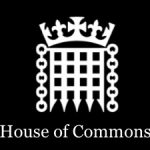
Definitions
[with added emphasis]
science (n.)
sci· ence ˈsī-ən(t)s
1a: knowledge or a system of knowledge covering general truths or the operation of general laws especially as obtained and tested through scientific method
b: such knowledge or such a system of knowledge concerned with the physical world and its phenomena : NATURAL SCIENCE
2a: a department of systematized knowledge as an object of study
the science of theology
b: something (such as a sport or technique) that may be studied or learned like systematised knowledge, have it down to a science
3: a system or method reconciling practical ends with scientific laws, cooking is both a science and an art
4: capitalised : CHRISTIAN SCIENCE
5: the state of knowing : knowledge as distinguished from ignorance or misunderstanding
general (adj.)
c. 1200, “of wide application, generic, affecting or involving all” (as opposed to special or specific), from Old French general (12c.) and directly from Latin generalis “relating to all, of a whole class, generic” (contrasted with specialis), from genus (genitive generis) “stock, kind” (from PIE root *gene- “give birth, beget,” with derivatives referring to procreation and familial and tribal groups).
What is common is of frequent occurrence. What is general admits of comparatively few exceptions: the general opinion (the opinion of the majority); the general welfare. [J.H.A. Günther, “English Synonyms Explained & Illustrated,” Groningen, Netherlands, 1904]
Used in forming titles from late 14c. with the sense “having general authority or jurisdiction, chief.” Phrase in general “without exception, in one body; as a rule, generally, not specifically” is from late 14c. General rule, one applying to an art or science as a whole, is from c. 1400.
knowledge (n.)
early 12c., cnawlece “acknowledgment of a superior, honor, worship;” for the first element see know (v.). The second element is obscure, perhaps from Scandinavian and cognate with the -lock “action, process,” found in wedlock.
From late 14c. as “capacity for knowing, understanding; familiarity;” also “fact or condition of knowing, awareness of a fact;” also “news, notice, information; learning; organized body of facts or teachings.” The sense of “sexual intercourse” is from c. 1400. Middle English also had a verb form, knoulechen “acknowledge” (c. 1200), later “find out about; recognize,” and “to have sexual intercourse with” (c. 1300); compare acknowledge.
truth (n.)
Old English triewð (West Saxon), treowð (Mercian) “faith, faithfulness, fidelity, loyalty; veracity, quality of being true; pledge, covenant,” from Germanic abstract noun *treuwitho, from Proto-Germanic treuwaz “having or characterized by good faith,” from PIE *drew-o-, a suffixed form of the root *deru- “be firm, solid, steadfast.” With Germanic abstract noun suffix *-itho (see -th (2)).
Sense of “something that is true” is first recorded mid-14c. Meaning “accuracy, correctness” is from 1560s. English and most other IE languages do not have a primary verb for “speak the truth,” as a contrast to lie (v.)
faith (n.)
mid-13c., faith, feith, fei, fai “faithfulness to a trust or promise; loyalty to a person; honesty, truthfulness,” from Anglo-French and Old French feid, foi “faith, belief, trust, confidence; pledge” (11c.), from Latin fides “trust, faith, confidence, reliance, credence, belief,” from root of fidere “to trust,”from PIE root *bheidh- “to trust, confide, persuade.” For sense evolution, compare belief. It has been accommodated to other English abstract nouns in -th (truth, health, etc.).
From early 14c. as “assent of the mind to the truth of a statement for which there is incomplete evidence,” especially “belief in religious matters” (matched with hope and charity). Since mid-14c. in reference to the Christian church or religion; from late 14c. in reference to any religious persuasion.
evidence (n.)
c. 1300, “appearance from which inferences may be drawn,” from Old French evidence, from Late Latin evidentia “proof,” in classical Latin “distinction, vivid presentation, clearness” in rhetoric, from stem of Latin evidens “obvious, apparent” (see evident).
Meaning “ground for belief” is from late 14c.; that of “obviousness” is from 1660s and tacks closely to the sense of evident. Legal senses are from c. 1500, when it began to oust witness. Also “one who furnishes testimony, witness” (1590s); hence turn (State’s) evidence.
prove (v.)
c. 1200, prēven, pruven, proven “to try by experience or by a test or standard; evaluate; demonstrate in practice,” from Old French prover, pruver “show; convince; put to the test” (11c., Modern French prouver), from Latin probare “to make good; esteem, represent as good; make credible, show, demonstrate; test, inspect; judge by trial” (source also of Spanish probar, Italian probare, and English probe), from probus “worthy, good, upright, virtuous.”
This is from PIE *pro-bhwo- “being in front,” from *pro-, extended form of root *per- (1) “forward,” hence “in front of,” + root *bhu- “to be,” source also of Latin fui “I have been,” futurus “about to be;” Old English beon “to be;” see be.
From early 13c. as “render certain, put out of doubt,” also “establish the validity or authenticity of a will, etc.” By c. 1300 as “test and find worthy, virtuous, false, etc.,” also “find out, discover, ascertain; prove by argument.” By mid-14c. as “check the accuracy of.” The meaning “be found to be (a hero, coward, etc.) by experience or trial” is by late 14c
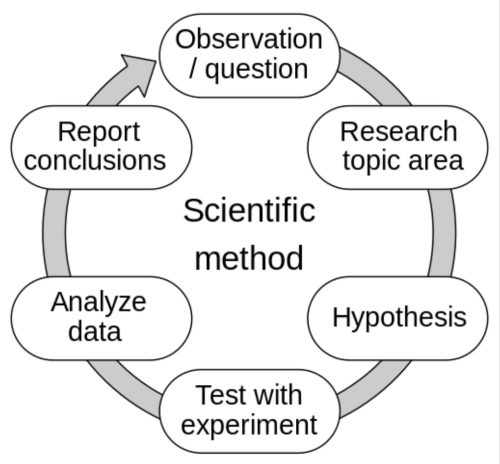
Introduction (Research Topic Area)
Legal Maxim:
- Law is the perfection of reason, which commands what is useful and necessary and forbids the contrary.
The articles here on this platform explain scientifically how your everyday life is governed, and I show you the general laws and mechanisms used around your governance. These articles at the top of the Home Page, are introductory pieces for those at each end of the governance spectrum: Christians and Atheists. Both groups may have been deceived either by, not being able to access all of the evidence available to them, or by, ignoring some of the evidence available. Science is about evaluating all of the available evidence.
These introductory articles will prepare you for what you can expect here. The articles are my attempt to lay the groundwork for you, so that further discussions can flourish from that. This article on atheism and atheists, is written through the specific lens of law and governance; which I hope will bring you a completely new perspective on this subject.
You cannot have a serious discussion about atheism, or law and governance, without discussing The Bible. I feel that some Christians do not fully understand their beloved Book; and I believe that many are being deceived (see: Christians Have You Been Deceived?). Perhaps the group that is being deceived the most however, are those at the other end of the spectrum on law and governance: the atheists. Despite your lack of a belief in God, your lives are dominated by what is written in The Bible. This article will show you how that is so, and importantly, why this is the case. A good introductory article here is: #2, What Do You Know?, which touches briefly on how we attain “knowledge”, and why we may not know as much as we think we know.
Atheists, I am not here to “convert” you, rather to scientifically point out, why you have become a third class citizen in your own country. Although you have rejected God, the fact that your are a citizen, means that you have opted to be governed by a different god, and a less favourable one at that. My aim is to show, and explain to you, how and why this has happened. I am not setting out to embark on some huge philosophical debate, but rather point out an area of discussion that you may not be aware of.
- There is no belief required for you to understand what has happened to you in the eyes of the Law; because it has already happened to you. We already have the end result, (the fact) we are going to reverse engineer how the fact came about.
This will be a practical analysis, scientific in nature, and a good examination of the process that ended up with the fact, that you as a citizen have been affected by: God, and god. Two deity’s for the price of one citizen.
I am not simply claiming in this article that God exists merely because you find yourself as a minority in a Christian society, or just because there are signs of this belief structure everywhere, such as religious buildings all around you. That of itself is not enough, and is not proof in and of itself. My aim is to examine the influence the Bible has over your life, and to show you that because you have rejected the teachings in The Bible, you are being governed in a different way; specifically because you rejected God. Is that a tall order? We shall see. There will be proof, evidence, and information revealed here for you, that I have never heard Christopher Hitchens, Stephen Fry, or Richard Dawkins and the like, mention in any debate that I am aware of. It must also be said that I have never heard anyone on the Christian side of the debate reveal, what I will to reveal to you here. I actually feel that, many Christians are as deceived as the atheists have been. I have put together for you many different types of source material, which comes from many different places. All the information tells the same story. This evidence is from, for example: historic religious documents, word definitions, Kings and Queens, Parliamentary laws, political actors, and judges. This will show the atheist is deluded, and has chosen a god, hypothesis.
The Atheist Delusion (The Hypothesis)
This will only be a sketched outline of the atheist position as a third class citizen; a low resolution look at the subject, which you can fill out further by reading the other articles here. This outline argument will be proved and evidenced by some external links, word definitions, and will require some logical thought. A much more detailed explanation on the different areas of this topic can be found at: Article #3 The Framework of Law and Governance. Given that this is a scientific study of the topic, we will not rule out any relevant body of information, or facts, or teachings, from this study, which will further our understanding.
This section is about the atheist citizen, which is an oxymoron. An atheist might be surprised to hear me state, that anyone who finds themselves as a citizen of a country, which is a polity, has already chosen a new god; but not The LORD God. That statement may shock as many Christians as it does Atheists. I have elaborated on this specifically at article #5, How You Became Entangled In The Legal System Pt.1. It shows in detail how Christians and atheists alike voluntarily chose a god and a lord to rule over them, provably so.
An Overview of the Citizen Experiment, and Analysis of Data:
UNITED KINGDOM (UK) is the title of a polity. This is why it is represented by Flags and Heraldic Signs in the link. Great Britain is a landmass which is why it is represented by a photograph of the landmass, and not any political flag, or the heraldry of a polity. A polity is a political organisation. Political organisations, and other organisations such as corporations, are what is known in law as a legal fiction and as such are a body corporate. This is, precisely what it sounds like, a corporate body. Other body corporates are: TESCO, or WALMART. Another title for a body corporate is a legal person, as evidenced in the links, and a legal fiction is also known as a person in law. In short a country, is a polity, which is a person. I will offer some legal definitions of person shortly.
I do not think it is controversial to say that the former Queen, and now King of the UK, stand under God. From their various oaths and comments at such ceremonies as the Coronation, it is clearly evidenced that the Monarchy believes in God. Here is a link to the Queens coronation ceremony, whereby much of this is apparent:
From the coronation, we can confidently state that these things were made evident:
- A Book is presented to the Monarch and told “We present You with this Book, the most valuable thing this World affords”. If this Book is The Bible, then its teachings have a huge significance in the way a country is governed.
- Monarch’s place God above themselves, a Monarch’s duty is to serve the peoples of Britain, and to rule over the citizens of the UK (polity).
- The Monarch, clearly has authority in two jurisdictions of law and governance. Those jurisdictions are: the lawful jurisdiction, serving the people of God at Britain, and the legal jurisdiction to rule over his/her persons of the UK.
- The people are subject to God to be served by the King, and persons are the subjects of the King.
These are some of the basic facts of how a law and governance operates on most landmasses. This system does not require the belief of any of its citizens, this is how it is de facto, and de jure.
Those who do not have a belief in God, or who may be ignorant of God, go straight to being ruled over by a King, or a president, as a commoner citizen. That is de facto, It does not matter what you, as an atheist, or a Christian, be-lie-ve to be the case, or what your opinion on the matter is. It is irrelevant. This is why (as you read this) you, the atheist, are subject to a King and the policies of the UK polity. You are the King’s subject, precisely because you chose to be an atheist. Those that have a faith in God, get the opportunity to be under His lawful jurisdiction, but only if His commandments, and orders are obeyed as written in The Bible. Nobody on Earth gets to escape the Law or Governance, Christian or Atheist, you do however have the opportunity to choose your Master. Everyone has that opportunity, to choose the Master, that is the free will element of citizenship. A true follower of The LORD God will be subject only to the lawful jurisdiction of The LORD God, as they are directed in The Bible, and will not be under the legal UK , or liable for UK legal policies, as an atheist is.
- Matthew 6:24 KJV 1611 – No man can serve two masters: for either he will hate the one, and love the other; or else he will hold to the one, and despise the other. Ye cannot serve God and mammon.
There really is no escape from the above quote for a Christian. The Strong’s Concordance definition of the word master leaves no room for error or doubt. You can not be subject to a worldly King, and The LORD God. It is written.
It is said that fear of the LORD is the beginning of wisdom. Fear also means reverence. The Bible is one of the sources that contains the knowledge that I am evidencing for you here. This chapter at the book of Matthew elaborates on why the yoke of Jesus is light as opposed to man’s laws and yoke:
- Matthew 11:29-30 KJV 1611 – Take my yoke upon you, and learn of me; for I am meek and lowly in heart: and ye shall find rest unto your souls. For my yoke is easy, and my burden is light.
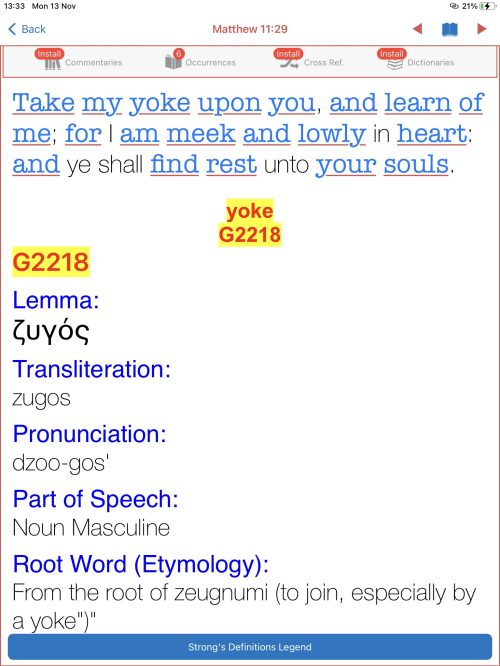
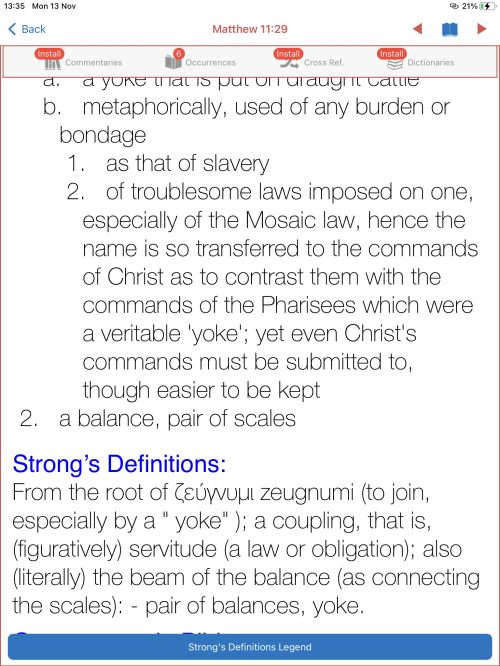
It is sad but many Christians fall foul of Matthew 6:24. A Christian will not willingly wish to serve two masters, but in reality, and out of ignorance, they do. An atheist does not serve two masters, because they have decided to be a subject of a King, and not God. The atheist does not fall foul of the Matthew Chapter but will break the commandment: “thou shalt have no other gods before me”. An atheist only serves the one master; a King. Whereas a King clearly has a duty to serve Gods people. Given the choice I think most would prefer a King to serve them, rather than be a servant to King Charles. This is the situation as evidenced in The Bible, the UK legislation, word definitions, and by the coronation service itself, and other public actors in office. Here is a useful link to explore the text of the coronation service. It is highly enlightening:
- Coronation transcript: Transcript
Atheists, you chose to be ruled over by a King, a lord, a god. You are governed by the policies of a polity (UK) which does not exist in reality, because it is a legal fiction, which exists only in your mind, as evidenced. All of your masters and lords (of which you have many) revere and worship a different LORD than you do: God. The system of law and governance around the world derives from The Bible, whether a population believes in it or not, no belief is required. I wonder if there is a possibility that your King, and your lords, know something that you currently may not?
All of those persons that make the legal rules which govern you meet every year at Westminster Abbey. The Monarch’s top ministers, and officers, meet at Westminster Abbey to mark the start of the Legal Year. Here is the service sheet for the Legal Year service held at Westminster Abbey:
At the start of the Parliamentary year Members of Parliament (MP’s) swear an oath to God:
At the start of each day at Parliament, MP’s pray to God. It is clear who the politicians (your masters) regard as their supreme authority.
Source of photograph: Parliament Prayers
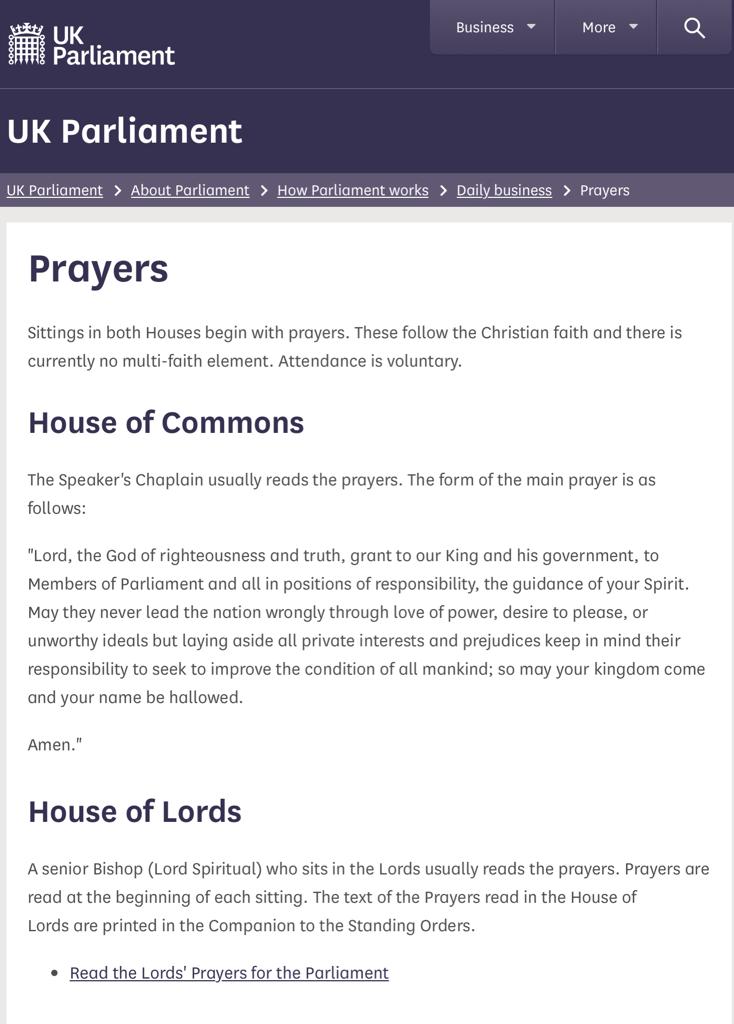
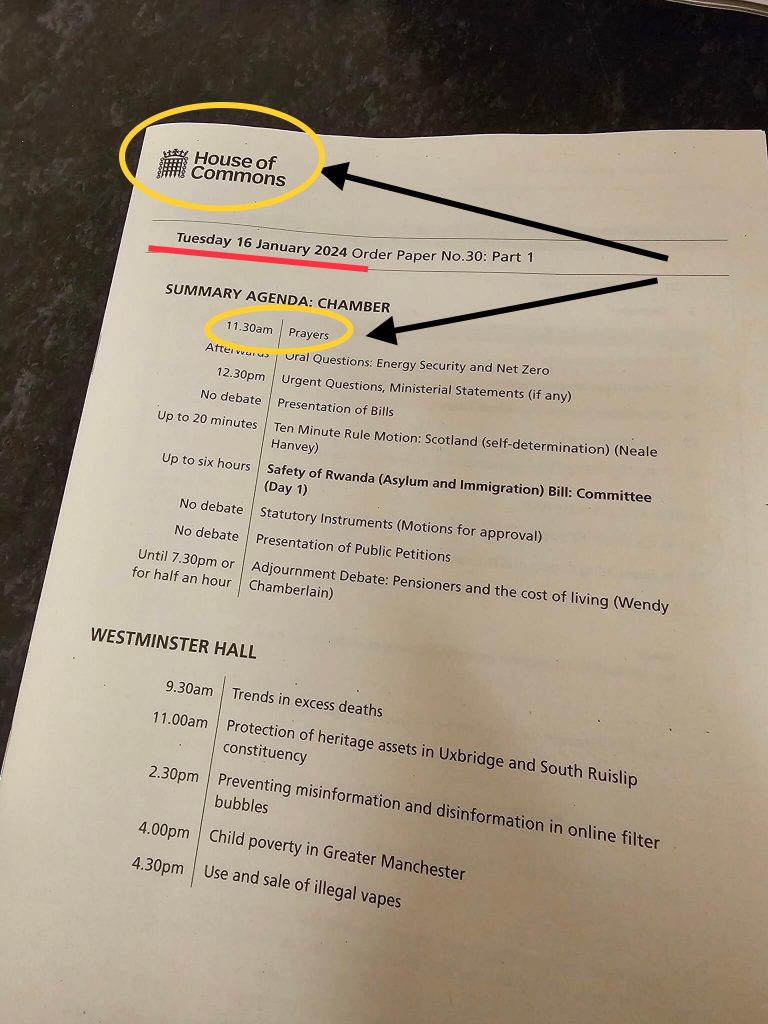
Every law court in the land has a Bible in it, and logic tells me, given everything I have evidenced here, that The Bible, and the LORD God. have everything to do with law and governance.
We have established (in a rough outline here) that, at Britain (the landmass), we have a polity titled UNITED KINGDOM. The King at Britain serves the peoples of the landmass, and rules over the persons of the polity (UK). Those are the Monarch’s two main roles. That is why he wears two hats. That is why he actually wears two hats. The monarch, as evidenced above, wears two crowns of office. One crown from God to serve the people, another is the Imperial Crown to rule over the persons of the polity (UK).
In simple terms; the UK is a polity, which by definition only exists in your mind, it is intangible, a legal fiction. Because it is a legal fiction, a King, a flag, and an anthem, represent the polity. It is a body politic. Just as the former YUGOSLAVIA was a legal fiction, it no longer exists in peoples minds, or as a country. People do not, and can not live in a political body. Those that “live” in a polity are what is known in law as: persons. The law regards persons and legal fictions as the same: intangible figments of your imagination, and existing only as a contemplation of law. Here are some legal definitions of the word person, which goes to prove this point:
• Definition of ‘Person’ from Blacks Law Dictionary 4th Edition:
PERSON. 1. This word is applied to men, women and children, who are called natural persons. In law, man and person are not exactly-synonymous terms.
Any human being is a man, whether he be a member of society or not, whatever may be the rank he holds, or whatever may be his age, sex, &c. A person is a man considered according to the rank he holds in society, with all the rights to which the place he holds entitles him, and the duties which it imposes. 1 Bouv. Inst. n. 137. 2. It is also used to denote a corporation which is an artificial person.
• ‘Person’, Blacks Law Dictionary 8th Edition definitions:
2. The living body of a human being <contraband, found on the smuggler’s person >: 3. An entity
(such as a corporation) that is recognized by law as having the rights and duties of a human being – in this sense, the term includes partnerships and associations, whether incorporated or unincorporated.
“So far as legal theory is concerned, a person is any being whom the law regards as capable of rights and duties. Any being that is so capable is a person, whether a human being or not, and no being that is not so capable is a person, even though he be a man. Persons are the substances of which rights and duties are the attributes. It is only in this respect that persons possess juridical significance, and this is the exclusive point of view from which personality receives legal recognition’
• person (n.)
c. 1200, persoun, “an individual, a human being,” from Old French persone “human being, anyone, person” (12c., Modern French personne) and directly from Latin persona “human being, person, personage; a part in a drama, assumed character,” originally “a mask, a false face,” such as those of wood or clay, covering the whole head, worn by the actors in later Roman theater. OED offers the general 19c. explanation of persona as “related to” Latin personare “to sound through” (i.e. the mask as something spoken through and perhaps amplifying the voice), “but the long o makes a difficulty ….” Klein and Barnhart say it is possibly borrowed from Etruscan phersu “mask.” De Vaan has no entry for it.
From the above definitions we can see that:
“A Person and man are not synonymous terms”
“A person is a corporation; which is a legal fiction”
“A person holds a rank in society” (legal society) and has duties imposed
One definition of: person from a UK Act of Parliament states:
• The “Petition Of Right” [1627] states that a ‘person’ is a ‘Souldier and Marriner’.
“Soul – dier” perhaps that is a clue for the Christians and maybe even the atheist reading this, as to why it is so bad in the eyes of the LORD God. Clearly a person is also a legal fiction at law, which makes perfect sense, because if you have a fictional entity known as a country, you can only have fictional entities that “live” in it. That is how the law works, and that is how a country operates. It is all about legal fictions. It is all fictional. As I have said, I have other articles available which drill down much more on this specific topic. This is only an outline. See article #5 for much more detail – How You Became Entangled In The Legal System
Personal Witness Testimony as Evidence
I have used this information in my own legal battles against the local council and HM Revenue & Customs, and was successful. I have helped many others at court, and in other legal battles without going to court. I have been immersed in this topic for a long time, and I sometimes forget that most of the population have no clue as to what a legal fiction is.
More recorded evidence of a legal fiction being “outed” at a magistrates court in the UK, here is a link whereby someone brings up the topic of a legal fiction at court, and the police get called:
The Outline and Summary on the Above Section
Real people live at real and tangible: Britain. Persons “live” in the UK, which are both fictions of the law. Here are a few legal maxims with regards to legal fictions:
• A fiction is a rule of law that assumes something which is or may be false as true.
• Where truth is, fiction of law does not exist.
• There is no fiction without law.
• Fictions arise from the law, and not law from fictions.
• Fiction is against the truth, but it is to have truth.
• In a fiction of law, equity always subsists.
• A fiction of law injures no one.
Even an atheist might be interested to hear what The Bible has to say about persons:
• Job 32:21 – 22, KJV 1611 – Let me not, I pray you, accept any man’s person, neither let me give flattering titles unto man. 22 For I know not to give flattering titles; in so doing my maker would soon take me away.
• Job 13:10, KJV 1611– He will surely reprove you, if ye do secretly accept persons.
• Romans 2:11, KJV 1611 – For there is no respect of persons with God.
• Proverbs 24:23, KJV 1611 – These things also belong to the wise. It is not good to have respect of persons in Judgment.
• James 2:9, KJV 1611 – But if ye have respect to persons, ye commit sin, and are convinced of the law as transgressors.
• Acts 10:34, KJV 1611 – Then Peter opened his mouth, and said, Of a truth I perceive that God is no respecter of persons.
I have spent some time here expanding on, and explaining for you what a person is at law, because so few have any idea; Christian or atheist. When I first learned what a person was legally speaking, I knew it was revolutionary for me in my life. It was the key to turning around my own serious legal problems, as mentioned in the Introduction. All liabilities attach to the person and not you.
If you, as an atheist previously had no idea about what a person might be at law, then you have no idea what you are acting as, and no idea what the ramifications of that are for you, and you had no idea what The Bible was trying warning you about. If you truly understood the ramifications of being the legal person which you currently are; I do not think you would be an atheist or a person. That is how powerful this aspect of law and governance is for atheist and Christian alike, and both have been deceived, as you may now be beginning to understand perhaps?
The Last Word on Persons
The above message about persons from The Bible can be heard when Judge Kavanaugh takes his oath as a Supreme Court judge in the video link below, when he affirms he will be “no respecter of persons”. More evidence of the supremacy of the Word of God and that The Bible contains The Law. So here you have a Supreme Court Judge who presides over the legal and lawful jurisdictions swearing on oath to be “no respecter of persons,” which is the very thing that every single atheist has chosen to be: a “person”. It is also worth mentioning here this legal maxim:
• Judici satis paena est quod Deum habet ultorem. It is punishment enough for a judge that he is responsible to God
A maxim is an irrefutable truth, this alone proves the case against the atheist position.
It is clearly not good to be a person by any measure of the law. Yet most of you reading this will be citizens of your relative country, and have therefore elected to become persons of your own free will. The reason why every single atheist will be a person every single time, is because you do not have a faith in God or understand The Bible, therefore that only leaves you with the only option left for you: to be a third class citizen at law, a third class person of the state: a commoner. An atheist, because of his or her stance on God, has voluntarily relegated themselves to the gutter of law and governance, to be a commoner; a member of the third estate of the realm.
The Jurisdiction Of The Third Class Citizen
This chapter will look at why every single atheist will be a third class citizen and can not escape from the liabilities of the citizen. Again to save me duplicating everything, I have written an article #6 which looks specifically at The Two Main Jurisdictions. This will be a rough overview.
From People To Personage [bondage]:
When you register to vote you consent and volunteer to be represented by Members of Parliament (MP’s).
In the UNITED KINGDOM there is an Act of Parliament called the: Representation of the People Act 1867 whereby it states that a “Man” is entitled to be registered as a voter. However in doing so, that “Man” then becomes a person and citizen of the UNITED KINGDOM, and is then seen as an agent, franchisee, and employee of the Crown as per the various legal definitions of: person. That person is then given a new rank and title in its new society.
How many Christians and atheists who are reading this, regularly use their titles “Mr and Mrs Smith”, or “Mr and Mrs Jones”, and have no idea what those titles mean, or how it could possibly relate to the Bible, or law and governance?
The Bible says at Matthew 23:10, KJV 1611 – neither be ye called masters: for one is your Master, even Christ. Were you aware that Mr, Mrs, Ms and Messers are all titles that belong to a persons name, and that all of those abbreviations mean master? “Belongs to a persons name” – not your name – but a persons name: Man’s person. The Bible specifically informs us not to be called master, yet you may call yourself master, and may let others address you as master nearly every single day. These are just a few points that are revealed in the KJV 1611 Bible.
The UNITED KINGDOM is the title of a corporate polity that operates out of Britain. Britain is the landmass, and UNITED KINGDOM is the title of a corporate body (a legal fiction).
Your act of registering to vote, and voting, makes you a person, a citizen, and an franchisee of the corporate body titled: UNITED KINGDOM. All of the [laws] policies for that corporate body are known as Acts and Statutes and they now apply to the person that you have become (the hyperlinked definition of “become” is very telling – befall). You walked away from the capacity of being one of the people and that jurisdiction, to become one of many persons under a new lord, and have acquired a new status, as part of the body politic of government. All the while your superiors (The powers that be), have maintained their relationship with The LORD GOD, you fell, not them. “The powers that be are ordained by God”
When you vote, you attorn and to attorn is to transfer allegiance, or homage to another lord (which is why it is against the Commandments). So if you registered to vote, and or vote in an election, you attorned, and turned your back on God and pledged allegiance to another god. Why do you think there is an “Attorney General” in governance? An office dedicated to oversee all of the attorners, of which there are many.
This is precisely why the name of that Act: The Representation of The People Act 1867, states that the people Have been re – presented, not persons. It is not the re – presentation of persons Act; but people. It re – presents people, as persons. You start off as people, and are re – presented as persons. You start out at Britain, and that jurisdiction [lawful] as a people, and then enter the legal UK jurisdiction as a person.
- represent (v.)
late 14c., representen, “show, display, express; bring to mind by description,” also “to symbolize, serve as a sign or symbol of (something else, something abstract); serve as the type or embodiment of;” also be a representative of” (the authority of another).
A Diagram of the Two Main Jurisdictions at Britain and Most Countries:
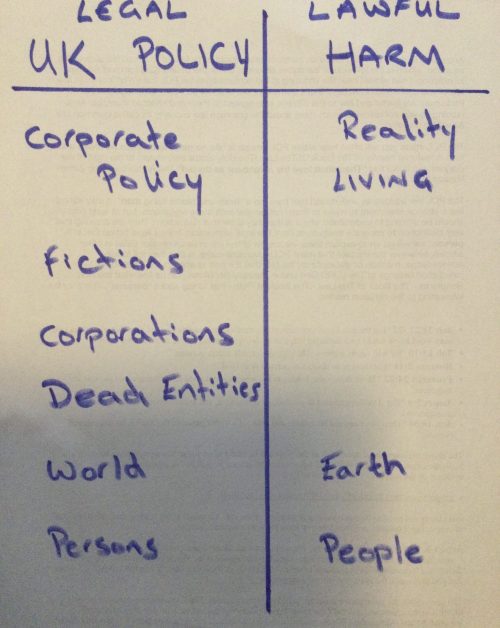
The atheist need only concern themselves with the jurisdictional area to the left of the above diagram. Some Christians may have found themselves over to the right hand jurisdictional area of the diagram, and may have the ability to manoeuvre between the two jurisdictions, because of their Biblical knowledge. The atheist has unwittingly (perhaps ignorantly?) ruled themselves out of the right hand section of the diagram, the atheist exists solely to the left side, as a person / citizen of the state, and we have already shown what the legal profession thinks of their own persons, via the Supreme Court oath taken by: Judge kavanaugh.
To the left of the diagram are are all UK policies which are known as Acts of Parliament. This is the legal jurisdiction. A citizen will have lots of legal burdens. My article #1 explains this in more detail. Some legal burdens will include various taxes, various legal permits and licences. All things which bind a UK citizen.
To the right of the diagram is the lawful jurisdiction, whereby there are no UK policies to abide by.
The citizens/persons under UK legal jurisdiction are still also under the lawful rules on the right, although they can not access that peaceful jurisdiction, and they have to abide by the legal UK policies on the left.
The people under God on the right do not have to concern themselves with the legal UK policies of the left, and need only concern themselves with the lawful jurisdiction on the right. The people have to “do no harm”, or as Jesus put it “love thy neighbour as you love yourself”. The Bible talks in detail about being “delivered from the law,” fittingly at Romans; who were of course the law makers of the time (and still are – see civil law). Christian citizens of the UK be-lie-ve they have escaped the Romans, when in fact, and in point of law; they have not, civil law is Roman Law. There is no civil law in God’s jurisdiction.
- Romans 7:6, KJV 1611 – But now we have been delivered from the law, having died to what we were held by, so that we should serve in the newness of the Spirit and not in the oldness of the letter.
Everything which can be done on the right side of the diagram can be done freely, but can only be done on the left side via a licence. A licence is evidence that the activity that is being licensed can be done lawfully without a licence. You can not get a licence to punch someone in the face at the local pub, because it is unlawful (against biblical teachings) and therefore also illegal (against persons laws), as it causes harm. As an example, if a person can get a licence to drive, then it must be lawful for people to drive without a licence, because you can not licence an unlawful activity.
It will not just be the atheists who are citizens of a polity (country), there will be plenty of Christians who have been deceived, and are acting as UK persons of the state, under a new god. Christians have specifically been told in The Bible to: be in the world but not of it. A Christian has the ability, if he / she understands The Bible, to act IN the public (the world to the left on the diagram) – in the legal jurisdiction – and to be OF the lawful one when it suits them. A UK citizen can not claim the lawful jurisdiction because a citizen has attorned and pledged allegiance to another god, another lord, and do not, by definition, have faith in The LORD God.
Myths and Stories or Hidden Truth and Wisdom?
Even most atheists are familiar with the story of Moses leading his people out of Egypt, out of slavery and bondage. Egypt was the civilisation of that time. The polity of the day. Moses rescued Gods people from the slavery of the Egyptians, they used Gods people as slaves to build their empire. Perhaps this story makes more sense given the above diagram, because that is a very similar position to that of a citizen of a country. The citizens / commoners are the members of the third estate (lowest estate of the realm).
Because so many Bible stories are told so often to children, many atheists may be aware of them as well, even though you may have never read a Bible. Most have heard of the breaking of the bread to feed the five thousand. It may be less known that Jesus is said to return to gather the wheat, His followers are the wheat. The Lord’s Prayer talks of “give us this day our daily bread”. Wheat, bread; Jesus feeding five thousand with a loaf of bread…perhaps we need to use our loaf, our brain? The Lord’s Prayer, to my knowledge, is not about a bakery in heaven delivering bread daily. “Giving us this day our daily bread”, might mean giving us daily wisdom / knowledge, feeding our brain with knowledge. If we use our loaf (brain) it might mean that Jesus fed the five thousand with knowledge. Maybe The Bible is not what you think it is? Who / what else has ever warned you about being a person?
We have learned that persons are dead entities, known in law as legal fictions. Perhaps an atheist can now comprehend easier that Jesus was able to raise the dead? When you wake up and realise that you may be a citizen of a polity (none of which exist in reality), maybe you can go back to the land of the living, to the right of the jurisdictional model above. Be born again? I am sure many atheists here would not previously had any idea about a legal person, and therefore no idea that the Bible warns against such things. With the knowledge in The Bible, with the knowledge of Jesus, perhaps you can cross the jurisdictional line back to being one of the people that King Charles serves, as opposed to a person he rules over? Perhaps you to can be raised from the dead through the knowledge of Jesus and His Word (The Bible)?
Did you know that in The Bible it says that the Law is for the dead?
- Galatians 2:19, KJV 1611 – For I through the law am dead to the law, that I might live unto God.
That chapter and verse would match with the legal definitions, and my above diagram. Maybe the Law of Moses had to be written on stone for the dead, because they did not have it written on their heart? After all, you can not get blood out of a stone.
Each side of my diagram has a different law giver and a different jurisdiction. A different master, a different lord. Perhaps that is why The Bible says this:
- Matthew 6:24, KJV 1611 – No man can serve two masters: for either he will hate the one, and love the other; or else he will hold to the one, and despise the other. Ye cannot serve God and mammon.
The above quote perfectly aligns with my proposition and hypothesis.
The Faustian Bargain (Conclusions)
An atheist made the choice not to follow God, and may well act out his life in that manner. A Christian made the choice to follow God, but may have fallen short of the teachings in The Bible, and found him / herself under the same god as the atheist. Both are under a delusion. Both are under an inferior master, regardless of what they be-lie-ve.
- delusion (n.)
“act of misleading someone, deception, deceit,” early 15c., delusioun, from Latin delusionem (nominative delusio) “a deceiving,” noun of action from past-participle stem of deludere (see delude). As a form of mental derangement, “false impression or belief of a fixed nature,” 1550s.Technically, delusion is a belief that, though false, has been surrendered to and accepted by the whole mind as a truth
All of the articles on this platform comprise material evidence which substantiates, validates, and supports the hypothesis put forward. The outlined information given here in this article also supports the position that an atheist has volunteered to be governed by a god; not The God, but a god, precisely as spoken about and warned against in The Bible. The Bible as partially evidenced, explains all of these intricacies and has been doing so for centuries. Effectively warning and guiding Man on how not to be ruled by men. Legality Vs Morality, or man Vs God. No wonder Rome has killed so many who attempted to bring this information to the commoners.
In law and governance there is absolutely no option not to be under a master, a God. God makes the Laws, He even makes the laws which govern what will happen to those who have no faith in Him – “the powers that be are ordained by God”. That default system of governance is man’s legal system. If you secrete yourself away to a desert island with no other souls around, you may not then be under a legal system, under man’s laws, but you are still under a master and God, and if you attorn in that scenario, you may well be on your own: a lost soul, a soul-dier.
“Government” is there for those persons who do not know God, and as a result they need governing. I look at them as rebellious, unruly children. Can anyone really objectively disagree with that position? Just look at social media; Facebook and twitter, look at the news, adults acting like demented children. The rebellious, unruly children need babysitters equipped with truncheons and handcuffs [police] running around to wipe their backsides, and tell them “no”, stop, that is wrong. If they had a relationship with The LORD God, then they would not need a policeman to explain to them that what they are doing could harm someone. Sound familiar, does that sound like your mum, when you were six?
The Bible is a book dedicated to law and governance. In the book God allows for those who do not believe in Him, and those that do. Those that do not follow His Law through ignorance, or attornment, become the persons, and they, by default will be governed by man. Those that do have faith in God, and wish to follow His laws will have a lighter yoke, as the Bible puts it. Persons have to abide by the millions of policies of a polity. Gods people have to obey the Ten Commandments, and in the New Testament Jesus says, forget the ten, heres two:
- Mark 12:30-31, KJV 1611 – 30 and thou shalt love the Lord thy God with all thy heart, and with all thy soul, and with all thy mind, and with all thy strength: this is the first commandment. 31 And the second is like, namely this, Thou shalt love thy neighbour as thyself. There is none other commandment greater than these.
Those of you who have read some of my other articles will be familiar with the breakdown of the word government, Govern – men – t. Govern means control, and Men is of the mind, as in; men-sa, men-tal, mens rea . Govern – ment is control of the mind. Since they only deal in legal fictions, you can now understand why they are in the mind control business. Legal fictions exist only in the mind.
Testa – ment is also to do with the mind. A test of the mind. An old test – a – ment, and a new-test-a -ment, perhaps?
I would conclude that atheists and Christians alike have been deceived, and I would agree with Dawkins that many suffer from the: god delusion, even citizen Dawkins himself.
The new definition of irony? – an atheist does not believe in an “imaginary God” but chose a new god, and is a person at law, which is by definition: imaginary.
- [Consider the catch phrase:] “It may be true for you, but it’s not true for me.” What is the meaning of the concept “truth”? Truth is the recognition of reality. (This is known as the correspondence theory of truth.) The same thing cannot be true and untrue at the same time and in the same respect. That catch phrase, therefore, means:
a. that the Law of Identity is invalid;
b. that there is no objectively perceivable reality, only some indeterminate flux which is nothing in particular, i.e., that there is no reality (in which case, there can be no such thing as truth); or
c. that the two debaters perceive two different universes (in which case, no debate is possible). (The purpose of the catch phrase is the destruction of objectivity.) – Ayn Rand
If you feel that others would benefit from reading this article, please consider sharing it. If you would like to find out more about law and governance then you can start by reading my articles in ascending numerical order which will garner the best results for you.
More articles on Law and Governance can be read from the menu below.
If you feel like buying me a coffee, or making a donation, that would be greatly appreciated.
In good faith
CME